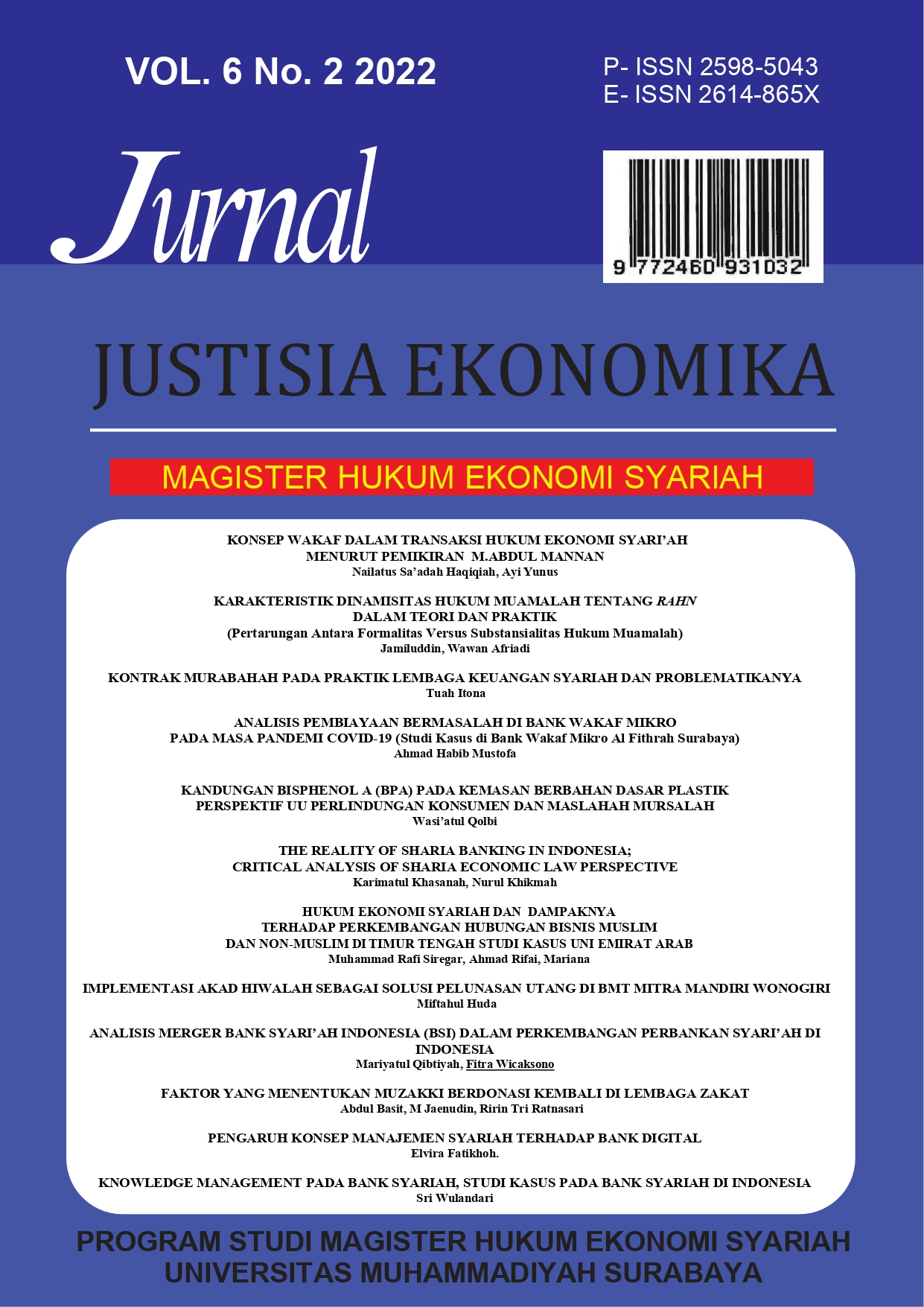FAKTOR YANG MENENTUKAN MUZAKKI BERDONASI KEMBALI DI LEMBAGA ZAKAT
DOI:
https://doi.org/10.30651/justeko.v6i2.15407Abstrak
This study aims to determine the muzakki's factors to re-donate in LAZNAS IZI. In addition, this study also wants to know the effect of service quality factors and the institution's reputation on the intention to re-donate at LAZNAS IZI. This study uses multiple linear regression by testing the effect of the Independent variables (X) on the Dependent variable (Y). There are four independent variables, namely Service Quality (X1), Reputation (X2), Attitude (X3), and Trust (X4). The dependent variable used is Intention to Redonation (Y). Primary data were obtained from questionnaires distributed to 97 IZI Zakat Institution donors who had donated more than once. From this research, it can be seen that Service Quality partially influences the interest to donate Back to IZI Zakat Institution. While Reputation, Attitude, and Trust partially have no effect. However, simultaneously all variables affect the interest of donors to re-donate to LAZNAS IZI. This study can be used by LAZNAS IZI as a reference to maintain several variables that are factors that donors are willing to redonation. In addition, variables that do not have a direct effect need to be developed with other variables together to have an effect and increase the donor's intention to redonation. The addition of the number of respondents and LAZ studied can also enrich the results of subsequent studiesReferensi
Abd. Wahab, N., Zainol, Z., & Abu Bakar, M. (2017). Towards developing service quality index for zakat institutions. Journal of Islamic Accounting and Business Research, 8(3), 326–333. https://doi.org/10.1108/JIABR-09-2015-0040
Andam, A. C., & Osman, A. Z. (2019). Determinants of intention to give zakat on employment income: Experience from Marawi City, Philippines. Journal of Islamic Accounting and Business Research, 10(4), 528–545. https://doi.org/10.1108/JIABR-08-2016-0097
Azizi, N. D., Shukor, S. A., & Sabri, H. (2019). Determinants of repeated endowers’ donation intention in cash waqf: A case study in Majlis Agama Islam dan Adat Melayu Perak (MAIPk). Jurnal Manajemen Bisnis, 10(2). https://doi.org/10.18196/mb.10175
Badan Amil Zakat Nasional. (2020). Outlook zakat nasional 2020. In Puskas Baznas. https://www.puskasbaznas.com/publications/books/1113-outlook-zakat-indonesia-2020
Beldad, A., Snip, B., & van Hoof, J. (2014). Generosity the Second Time Around: Determinants of Individuals’ Repeat Donation Intention. Nonprofit and Voluntary Sector Quarterly, 43(1), 144–163. https://doi.org/10.1177/0899764012457466
Farouk, A. U., Md Idris, K., & Saad, R. A. J. Bin. (2018). Moderating role of religiosity on Zakat compliance behavior in Nigeria. International Journal of Islamic and Middle Eastern Finance and Management, 11(3), 357–373. https://doi.org/10.1108/IMEFM-05-2017-0122
Ghani, E. K., Said, J., & Yusuf, S. N. S. (2012). Service Quality Performance Measurement Tool in Islamic Non-Profit Organisation : An Urgent Need. International Business and Management, 5(2), 71–75. https://doi.org/10.3968/j.ibm.1923842820120502.1115
Hadi, A. R. (2019). Intensi Masyarakat Membayar Zakat Melalui Badan Amil Zakat Kota Banjarmasin Arif. Jurnal Manajemen, 2(2), 232–246. https://ppjp.ulm.ac.id/journals/index.php/jim/article/download/1711/1362
Heikal, M., & . F. (2014). The Intention to Pay Zakat Commercial: An Application of Revised Theory of Planned Behavior. Journal of Economics and Behavioral Studies, 6(9), 727–734. https://doi.org/10.22610/jebs.v6i9.532
Huda, F. M. (2019). Universitas Islam Negeri Sunan Ampel Surabaya Fakultas Dakwah dan Komunikasi Jurusan Komunikasi Program Studi Ilmu Komunikasi.
Kotler, Philip dan Keller, 2007, Manajemen Pemasaran, Jilid I, Edisi. Kedua belas, PT. Indeks, Jakarta. Saladin,
Nado, A., & Sudana, K. (2021). Pengaruh Reputasi Perusahaan Dan Citra Merek Perusahaan terhadap Kepuasan Pembeli Pada Terapi Nuga Best Tahun 2020. Arthaniti Studies, 2(1), 66. https://doi.org/10.5281/zenodo.5549338
Saad, R. A. J., Farouk, A. U., & Abdul Kadir, D. (2020). Business zakat compliance behavioral intention in a developing country. Journal of Islamic Accounting and Business Research, 11(2), 511–530. https://doi.org/10.1108/JIABR-03-2018-0036
Sugiyono. 2001. Metode Penelitian Kuantitatif Kualitatif dan R&D. Bandung: Alfabeta.
Supardi, & Ayu Lestari. (2022). Analisis Faktor-Faktor Repeat Order Terhadap Implementasi Strategi Flash Sale Pada User Aplikasi Marketplace Shopee. Jurnal Ilmiah Manajemen, Ekonomi Dan Akuntansi, 2(1), 18–23. https://doi.org/10.55606/jurimea.v2i1.109
Suryana, P., & Dasuki, E. S. (2013). Analisis Faktor yang Mempengaruhi Keputusan Pembelian dan Implikasinya pada Minat Beli Ulang. Trikonomika, 12(2), 190. https://doi.org/10.23969/trikonomika.v12i2.479
Sutomo, S., Najib, M., & Djohar, S. (2015). Pengaruh Kualitas Pelayanan Lembaga Amil Zakat (Laz) Terhadap Kepuasan Dan Loyalitas Muzakki (Studi Kasus Laz Pkpu Yogyakarta). Jurnal Aplikasi Bisnis Dan Manajemen, 3(1), 59–70. https://doi.org/10.17358/jabm.3.1.59
Utami, N. S., Muthohar, A. M., & Ridlo, M. (2021). Analisis Tingkat Pendapatan, Kepercayaan dan Reputasi terhadap Minat Muzakki dalam Membayar Zakat dengan Religiusitas sebagai Variabel Moderating. Iqtishoduna, 17(1), 1–16. https://doi.org/10.18860/iq.v17i1.10630
Unduhan
Diterbitkan
Cara Mengutip
Terbitan
Bagian
Lisensi
HAK CIPTA
Penulis yang mengirimkan artikel dalam jurnal Justisia Ekonomika harus memahami dan menyetujui persyaratan tentang hak cipta jurnal Justisia Ekonomika sebagai berikut:
1. Hak Cipta tulisan / artikel yang diterbitkan di jurnal Justisia Ekonomika otomatis menjadi hak pengelola jurnal atau publisher
2. Meskipun Hak Cipta atas tulisan yang telah diterbitkan di jurnal Justisia Ekonomika adalah menjadi haknya publisher, tetapi penulis masih mempunyai hak untuk : a). Penulis boleh meng-upload di repository kampus, b). Penulis boleh meng-upload di webnya sendiri, c). Penulis boleh meng-upload di google schoolar, orchid dan sinta
LISENSI
Lisensi atas tulisan / artikel yang diterbitkan di jurnal Justisia Ekonomika adalah menggunakan Creative Commons dengan atribusi CC-BY-NC 4.0






















